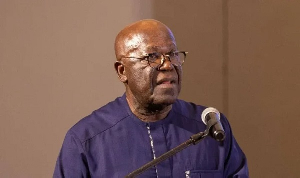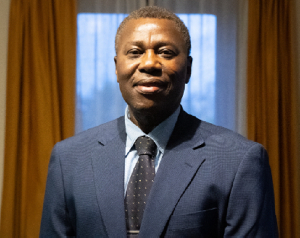The Third Word Network Africa (TWN-Africa) has described as unsatisfactory the responses of government officials on the new ‘development agreements’ between Government of Ghana and Gold Fields Limited.
The TWN argues that till date, there has not been a public disclosure of any detail of the agreements that were rushed through Parliament. “Gold Fields’ public disclosure to its shareholders is in stark contrast to the failure of our Government to disclose details of the agreements with Gold Fields. The only official pronouncements have been in response to questions from the media, including those provoked by TWN-Africa’s press conference, and these have not provided any of the details of the Agreements.”
On 29th March 2016 Gold Fields announced in Johannesburg that it had concluded “development agreements” with the Government of Ghana, reducing corporate tax in respect of its Tarkwa and Damang mines from a rate of 35.0 per cent to 32.5 per cent, and royalty from a flat rate of 5 per cent to a sliding scale starting from 3 per cent.
TWN- Africa submits that “from Ghana’s perspective we are foregoing $26m of tax and royalty income from the Tarkwa and Damang mines this year.”
Section 49 of the Minerals and Mining Act, 2006 (Act 703) provides that a Development Agreement involves the Government granting concessions or privileges to a mining company in exchange for the investment of more than $500m under a mining lease. Among such concessions is a stability agreement on fiscal issues in conformity with section 48 of Act 703.
TWN expresses grave concerns about the massive concessions granted the company and questions their legality, while seeking more convincing responses from government.
It insists that the tax and royalty cuts offered to Gold Fields Ghana Limited are illegal. It demands of Government to publish the Development Agreements with Gold Fields as well as disclose the enforceable investment commitments made by the Company which justify the Development Agreements.
The Network further demands that Parliament publishes the Report of the Mines and Energy Committee which recommended approval of the Development Agreements and explain what circumstances justified rushing the approval through Parliament.
It also calls on government to make public the roles played by various public institutions, structures and individuals in the development, negotiation and approval of the Development Agreement.
TWN laments government officials’ reluctance to disclose the details of the contract, and chastises them for using the claim of saving jobs and threats of potential mine closure as excuse to justify government’s action.
“Ironically rather than respond to the issues raised about the Gold Fields agreement public officials and Gold Fields officers have put forward the spectre of an Obuasi style closure of Gold Fields mines as a threat in defense of the agreements,” the Network observed.
Senior Vice-President and Head of Gold Fields’ West Africa Region, Alfred Baku, was quoted as saying that the firm plans to invest more than $500m. “The amount we are calling is the amount we are going to invest going forward and we think that between the two operations that we have in Ghana, we are going to invest in excess of the 500 million”, he reportedly told Citi FM.
However, Mr Baku did not indicate the period within which the investment would be made and what precise form it will take.
In a related development, Chief Executive of the Minerals Commission, Dr Tony Aubynn, told the media that the Development Agreements were based on an investment plan.
Dr Aubynn had asserted that the requirements for a Development Agreement have been met and that Gold Fields “had indicated that they are willing to invest more” and that Parliament assured itself of this before approving the Agreements. He, however, gave no details of the clear and enforceable commitments made under investment plan. Neither did he indicate a readiness by the government to publish the Agreements and the terms of Gold Fields investment plan so as to definitely clear the air.
According to the TWN, Dr Aubynn had also offered two other justifications for the Development Agreements, including the fact that Gold Fields have been in Ghana for a long time and have already invested over $2bn and the difficulties facing the company due to the drop in gold prices as well as the need to help the struggling Damang mine.
The Network said, “Whilst being vague on the exact nature and terms of new investments officials of Gold Fields have also been quick to talk up the potential benefits of the tax cuts for responding to the problems of the sector such as saving jobs.
“The challenges facing the gold mining sector and its knock on effects on public revenue are real and Gold Fields is not the only affected company. However, past investments, current financial distress due to price drops or a desire to stave off redundancies are not a legal basis for a development agreement under the terms of Act 703.
“Actually to avoid a repeat of the Obuasi experience it is important that Gold Fields development agreements contain firm and measurable commitments. The public interest in such a commitment is one of the bases of our demand for a full disclosure of the agreements,” it stressed.
Business News of Sunday, 24 April 2016
Source: topfmonline.com













